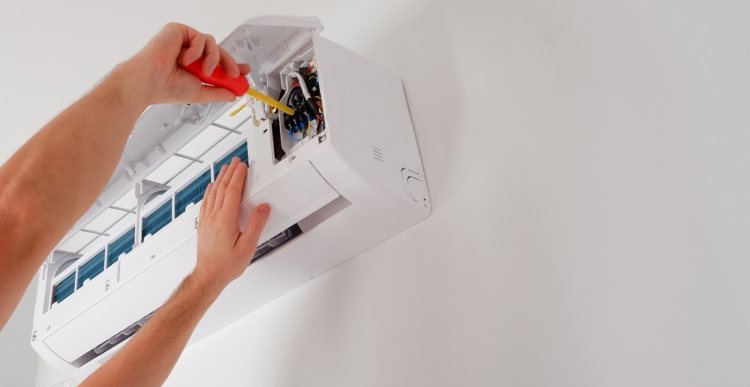
Have you ever stopped to consider your HVAC filter options? Choosing the right HVAC filter is a balancing act between adequate airflow, cost, and indoor air quality. Use this guide to help you understand the different types of HVAC filters, their efficiency ratings, and how to select the best option for your needs.
How is Filter Efficiency Measured?
Filters receive a minimum efficiency reporting value (MERV) based on how well they remove particles from the air. This rating system ranges from 1 to 20. Higher MERV ratings indicate the ability to trap smaller particles for enhanced indoor air quality.
Filter Types for HVAC Systems
Here’s a breakdown of different HVAC filter types and their corresponding MERV ratings:
- Disposable fiberglass filters: Typically rated MERV 1 to 4, these filters provide basic HVAC protection, catching large particles like lint, dust, and pollen. As the most affordable option, these filters are ideal if you’re looking to protect your HVAC system but not improve indoor air quality.
- Disposable pleated filters: Falling within the MERV 5 to 8 range, disposable pleated filters offer a middle ground in filtration efficiency. They’re crafted from polyester or cotton paper and use a pleated design to capture mold spores, pet dander, and finer dust particles. These filters are popular for homeowners seeking moderately improved air quality at a reasonable cost.
- Electrostatic filters: With MERV ratings of 8 to 10, electrostatic filters utilize self-charging cotton or paper fibers to attract and hold onto small particles. They are especially effective against bacteria and humidifier dust. Consider a washable version for a longer lifespan.
- Rigid-style cartridge filters: These filters boast MERV ratings of 11 to 12. Their thicker, pleated design allows them to capture a wide range of particles, including bacteria and tobacco smoke, without significantly restricting airflow. While ideal for residential use, they provide high-level filtration similar to what you might find in labs or hospitals.
- High-efficiency pleated filters: Rated MERV 13 to 16, these filters are constructed from dense, pleated synthetic cotton. They are capable of trapping very fine particles, including auto fumes, virus carriers, and insecticide dust. Due to their high efficiency, they’re typically used in commercial settings or medical facilities where air purity is crucial.
- HEPA filters: The pinnacle of filtration technology, HEPA filters rated MERV 17 to 20 trap at least 99.97 percent of particles smaller than 0.3 microns. Their exceptional efficiency makes them unsuitable for most residential HVAC systems. Instead, they are reserved for clean rooms and healthcare settings.
Choosing the Right HVAC Filter for You
Filters with MERV ratings above 15 may be a bit much for residential settings. Generally, a MERV rating of 5 to 15 is adequate, improving air quality without putting unnecessary strain on the HVAC system. Remember to replace your filter regularly to maintain efficiency.
If you need more help sifting through these HVAC filter varieties, or you’re interested in other indoor air quality solutions, turn to Oregon Heating & Air Conditioning. What we promise is what we deliver, so you can expect top-notch HVAC solutions and unmatched peace of mind. To request an HVAC service estimate in Portland, Beaverton, Hillsboro, or the surrounding area, please call us at (971) 444-6310.
The post Types of HVAC Filters and Their Uses appeared first on Oregon Heating & Air Conditioning.

